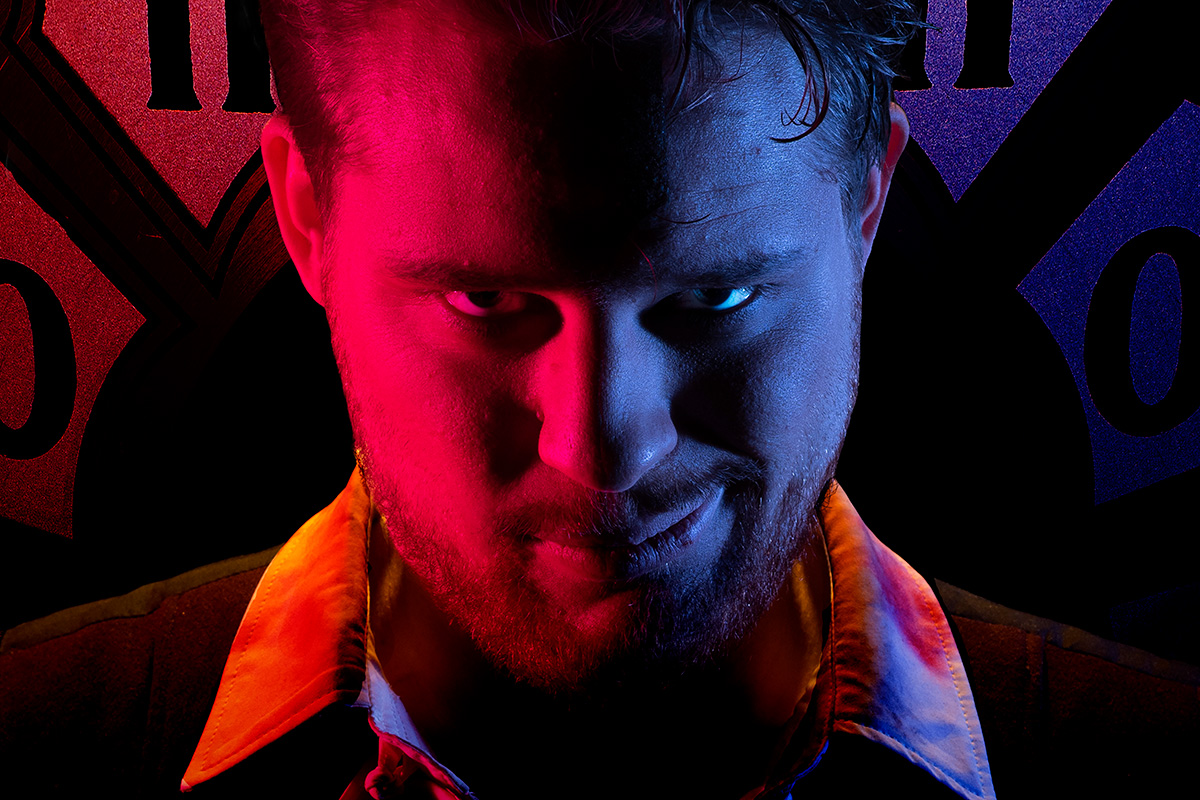
May 2020
Film Inquiry Review
By Daryl Macdonald
May 27, 2020
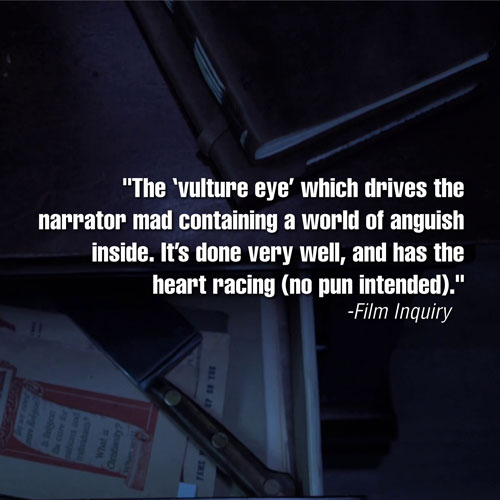
The Tell Tale Heart is one of Edgar Allen Poe’s best known, most revered tales. It is considered a classic of the Gothic genre, told by a master of that genre. Utilising the idea of the unreliable narrator (maybe one of the first in literature?) to its full extent and awash with the kind of gory, poetic detail Poe was known for, it lends itself well to the medium of film and has been adapted by just about everything from radio murder mysteries to The Simpsons to Spongebob Squarepants.
Here, we have a new take: a punky, blood-spattered thrill ride from McClain Lindquist, whose debut short brings something quite new to the story, while also staying true to the dark, Gothic brutality of Poe’s original work.
MADNESS AND MOCKERY
The story is told through an unnamed narrator who is trying his best to convince the viewer of his sanity while describing the details of the brutal descent into madness that lead to the death of an old man – whose relationship to the narrator is never explained. Any adaptation of this story would live or die on the strength of that narrator’s performance and to its credit, The Tell Tale Heart has an engaging, lively performance from Sonny Grimsley – chewing the scenery with such an infectious madness it’s easy to imagine he had a lot of fun in this role.
Grimsley really – and rightfully – is the scene-stealer here, gleefully expounding Poe‘s words in a mock-Tudor accent with a twisted smile on his face and devilish eyes. It’s an important anchor, because The Tell Tale Heart has no interest in chronological storytelling. Here, Lindquist has gone abstract, imbuing his version with whip-quick transitions and layovers which emphasise the strange madness taking place.
It’s a fun, jumpy ride through the old mansion; the audience is barely given time to digest one scene and its implications before we’re off to the next. In one scene our narrator is grimly regaling us from a dark room, only the barest of outlines visible, the next second we’re in an old man’s bedroom watching him sleep – bloodsoaked images streaking across the screen, the ‘vulture eye’ which drives the narrator mad containing a world of anguish inside. It’s done very well, and has the heart racing (no pun intended).
A BIZARRE WORLD
The madness cranks up as the story propels forward to its inevitable outcome; two police officers arrive on the scene to interrogate the narrator and cleverly the interrogation takes place in multiple locations, adding to the bizarre sense of confusion. The sets are excellent, emphasising Poe’s Gothic style while also evoking a slightly more modern tinge in some aspects. This duality also adds to the atmosphere of confusion; what is real and what isn’t? Special mention should also go to the old man’s make-up, which is something akin to a Jim Henson creation if it were commissioned by Roald Dahl. It is at once unnerving and repulsive, but somehow adds well to the tone being struck here.
The Tell Tale Heart only really has one performance once mentioning, which is that of the narrator. Both police officers and the old man get very little in the way of dialogue; however, what dialogue the police officers do get is somewhat squandered. Mikah Olsen goes for gruff noir and mostly misses the mark, while Teren Turner should have been given more to do as she proves to be the more natural of the two. That said, both actors were lost in the shadow of Grimsley‘s madcap performance in any case but manage to stay afloat in the madness.
Finally, the main set location inside the mansion is excellent – the lighting gives off a creepy, surreal vibe and the exterior shots show the kind of grand, dark abode Poe himself may very well have imagined when he began writing the story himself.
THE TELL TALE HEART: CONCLUSION
Lindquist is, by trade, an undertaker whose love of the horror genre and Poe’s work propelled him to this adaptation. His vision was to do justice to Poe’s story, to create a world worthy of the master himself. With this, it’s safe to say he’s off to a very good start. It’ll be very interesting to see what he comes up with next.
Review can be found at: https://www.filminquiry.com/tell-tale-heart-short-review/
10th Circle Review
By Dante Yurei
May 26, 2020
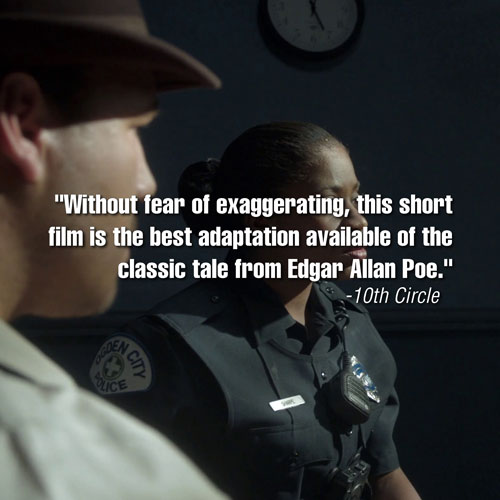
When I found out about the existence of this short film I have to admit that I got excited, as “The Tell-Tale Heart” is my favorite short story from writer Edgar Allan Poe. At the same time, some worry grew on me as by adapting any literary piece it is necessary to modify it so that it can be adjusted to the media in which it will be presented and to represent the style of who wants to adapt the piece, The short film “The Tell Tale Heart” is not only a worthy adaptation of an important literary work, but it also enhances all the qualities that make this piece be so terrifying.
After receiving a call from a neighbor, two police officers go to investigate the house where they suspect a murder has been committed. Both agents are received by an eccentric man, who is the caretaker of the owner of the house, a frail old man. While the officers conduct their interrogation, the caretaker breaks under the pressure and reveals a dark secret.
“The Tell Tale Heart” is an interesting delve into the mind of a madman. The plot of the film is narrated from the perspective of the caretaker, who is an unreliable narrator, and something in which the director McClain Lindquist capitalizes on by using time leaps and vibrant or somber cinematography to emphasize on his mental state. This dichotomy is emphasized even more in the way in which the short film is edited and with the excellent use of visuals and sound to accentuate the tension.
This modernization of a classic tale captures the viewer from the start with the voice and vocabulary of the narrator and makes its 22 minutes of runtime fly by. Besides modernizing it and emphasizing its qualities Lindquist introduces his own elements from horror cinema along with a few jump scares so that you cannot distinguish is the thumping you hear comes from the movie or from yourself. Without fear of exaggerating, this short film is the best adaptation available of the classic tale from Edgar Allan Poe and one that all horror movie fans will enjoy no matter how unfamiliar they are with the work of the author.
Review can be found at: https://www.10th-circle.com/2020/05/The-Tell-Tale-Heart-Short-Review.html
Film Carnage Review
By Film Carnage
May 22, 2020
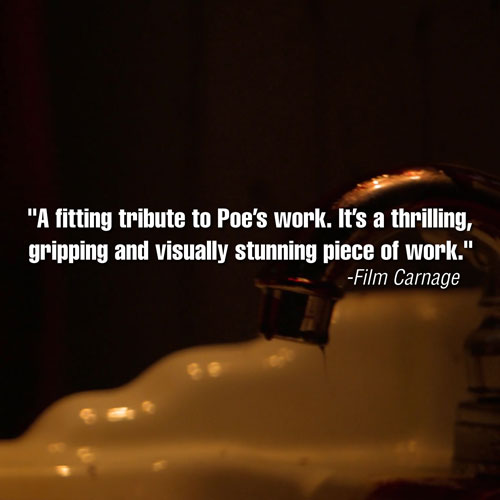
Directed by McClain Lindquist and co-written with John Lindquist, based on the classic Edgar Allan Poe story of the same name. Following The Narrator (Sonny Grimsley), who is haunted by the “evil eye” of The Old Man (James C. Morris) whom he cares for. Descending into madness, The Narrator murders The Old Man, then hides the body under the floorboards. When Detective Tucker (Teren Turner) and Officer Sharpe (Mikah Olsen) come inquiring about The Old Man’s whereabouts, The Narrator begins to unravel.
Opening on Sonny Grimsley introducing his tale of murder feels very Vincent Price 50’s horror inspired, the dark yet charismatic persona with a charming cadence, setting off immediately the question of whether to trust him. Layered on top of that monologue is some very fitting music (by Joel Pack) which impressively moves from a classical style that you’d naturally expect to find with Poe to a much more modern sound, reflecting horror films today. Those two things working together with a simple, darkened background, keep the focus on the lead as he sets the scene, interlaced with flashes of what’s to come and kick things off on strong form, foreshadowing the blend of classic and modern styles that the film uses throughout.
One of the other things that’s quickly clear is the attention to the importance of setting, a few brief exterior shots of a Victorian meets Gothic house, immediately have that air of horror, like the Bates’ or Amityville house, or even the murder house in the first season of American Horror Story, it strikes fear. The other main set being The Old Man’s (Morris) bedroom, it’s well decorated to reflect the period setting, it’s intimate and almost claustrophobic, which perfectly suits the tone. That attention to detail certainly goes through to the physical effects and make-up work, both of which are an art form that can frequently go underappreciated, particularly the latter, so when done well they make a strong impression, which is what you’ve got here. All of which adds up to the fact that the film has hit the nail on the head with its visuals, including a fantastic dolly zoom shot, a reverse shot disappearing below the floorboards and one particular use of lighting to reflect from a knife that’s particularly enjoyable to watch, it’s aesthetically pleasing from start to finish.
Its intensity is ever growing throughout, building the anticipation of that thrilling breaking point and it’s all set upon the shoulders of Grimsley who must portray The Narrator at his best and worst, both of which he does superbly. With the two versions being nicely overlaid to see both innocent and guilty, you get to see Grimsley’s acting skills at work in a very satisfying way and they only get better as the film nears its end. It’s a performance that’s both composed and unhinged, polite and ravenous. The Old Man doesn’t get too much time to really show Morris’ abilities but it’s a solid performance, while the other supporting actors playing the police officers feel more forced, they’re trying a little too hard, resulting in something that feels slightly wooden.
A great achievement of this adaptation is to simultaneously be influenced by the old-fashioned, classic style that the tale comes from and modern horror films, it makes a fusion of styles that works really well with the story they’re telling. It adds a little jump scares, with some gore to plenty of genuine storytelling, a lot of horror films have struggled with combining them all, either falling short on the story or being afraid to use gore, Lindquist has found a great ratio to fit them all together in a way that capitalises on the different elements and doesn’t let any of them disappear into the background. While there isn’t too much you can alter of Poe’s story without losing its signature style, the choices in direction really amplify its atmosphere in a way that feels fresh, avoiding any potential feeling of repetition with a story that’s now almost 200 years old.
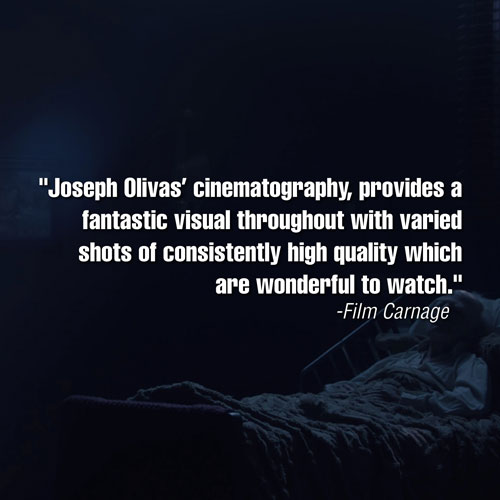
Lindquist’s adaptation feels as though it stays true to the original while throwing in a burst of modern style to bring Poe into the 21st century rather than simply trying to tell its tale in a typical or antiquated manner. His direction, paired with Joseph Olivas’ cinematography, provides a fantastic visual throughout with varied shots of consistently high quality which are wonderful to watch. Grimsley provides an excellently fitting voice and persona to The Narrator, beginning with a refined tone then gradually descending into madness. It comes through strongly in the finished product that a lot of care, attention and dedication has gone into revamping a classic story and giving it a satisfying update without losing any of its original quality, making a fitting tribute to Poe’s work. It’s a thrilling, gripping and visually stunning piece of work.
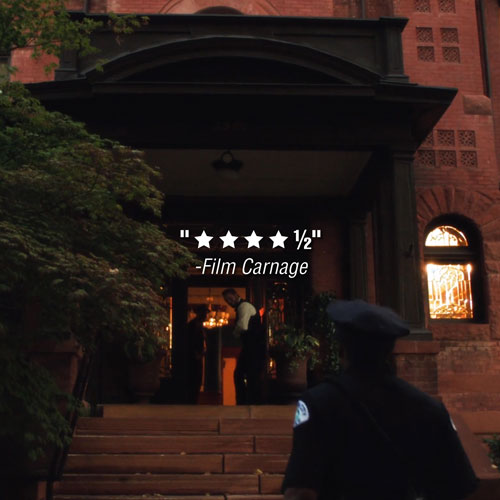
Verdict: ✯✯✯✯½ | 9/10
Review can be found at: https://filmcarnage.wordpress.com/2020/05/22/review-the-tell-tale-heart/
James “Jimmy” Boanerges Review
By James “Jimmy” Boanerges
May 21, 2020
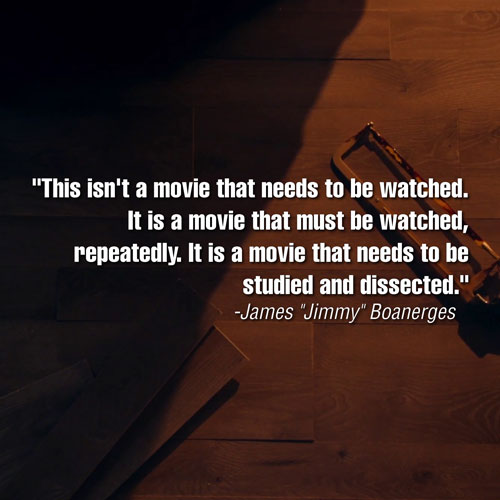
True Poe, True Horror, Truly Worth Watching
This isn’t a movie that needs to be watched. It is a movie that must be watched, repeatedly. It is a movie that needs to be studied and dissected.
There are a dozen reviews of this film by more qualified sources than this author, proclaiming the greatness of the movie, therefore it is the intent of this article not to critique, rather to express the experience of this fan.
On the surface, it is a brilliant adaptation of the classic Edgar Allan Poe story The TellTale Heart. Unlike so many of its predecessors in film, that dilute and cheapen, this adaption remains true to the intent of Poe’s work: the exploration of homicidal madness and the validity of the legal defense of insanity.
Everyone should be familiar with The Tell Tale Heart, if not, go read all 6 pages of it.
In director McClain Lindquist’s film, there isn’t a wasted scene, an unimportant line, or an insignificant camera angle in the entire film. The pacing is both smooth and breathtaking. The story is instantly engaging, the imagery is captivating, the acting is mesmerizing, and the editing and music are flawless. Perhaps the most amazing thing about this film is the most easily overlooked, that is the blending of Poe’s unique voice into the dialogue of the Narrator in a modern day setting. There isn’t a line uttered by this character that doesn’t sound like Poe himself wrote it—and it doesn’t feel forced. In fact there is a line of dialogue at the beginning of the movie that sets up this anachronism brilliantly.
Upon first viewing the movie, a well-crafted, and worthy story is presented. With each subsequent viewing subtleties emerge that call into question what has been taken for granted. Details that are easily dismissed in earlier viewings come forward to put entirely new twists into what is happening—and what is not. Two areasto watch forare the displays of simple technology (in the background) and the wardrobe of the characters (combined with how each character is lighted). These never mentioned details are key to unlocking just how mad the Narrator might be and give clues to which characters may not exist outside of the Narrator’s warped mind.
This movie is haunting in every meaning of the word. The balance it achieves is unbelievable. Anticipation of the climax is agonizing, yet knowing it will end is worse; there is too much to watch, while not being given enough to see; eyes are glued to the imagery, yet instinct screams to turn away; and the ending is final, while leaving hunger for more.
What Poe did with words, Lindquist does with images. Poe’s work engaged the reader’s imagination and gave it fuel to run wild and dark. Likewise Lindquist’s film embraces the audience’s subconscious fears, and lets loose those nightmares.
Disclosure: while the author was not on the set of this movie, he did participate in a prank by notorious teaser, John Lindquist, and penned a phony letter on behalf of the nonexistent Utah Union of Domestic Workers decrying the exploitation of domestic workers in a satirical slam of so-called watchdog groups.
Review can be found at: https://www.soconin.com/news-1/2020/5/21/the-real-review-of-tell-tale-heart
3PStart Review
By The3rdPlayer
May 19, 2020
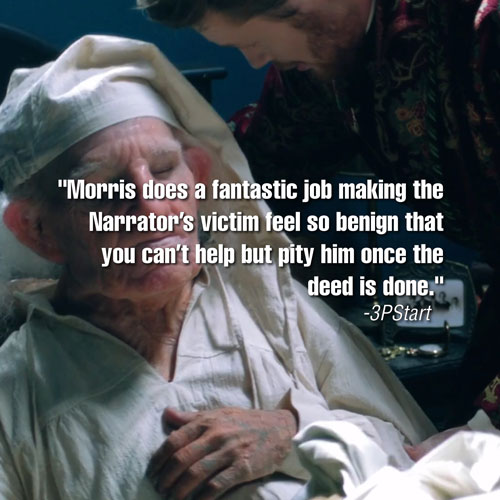
There is something charming and attractive about short films. There is an ingenuity and passion that tends to paint the screen over a small span of time and as a horror fan, I’ve come to see a lot of imagination and interesting effects while I’ve explored shorter works lately. The format brings out the need to tell a concise and engaging story that will leave an impression in less time than your average TV episode. It’s a challenge, and thankfully in the right hands, it can result in some excellent work.
I’ll be the first to admit that The Tell-Tale Heart is not my favorite piece of literature. I studied it to death in school, it’s been referenced in media all over the place- but I’d heard about a short film adaptation that, with some research, looked like a unique experience. Once I was given the chance to check it out for myself, my horror-loving independent film supporting self jumped at it, wary as I might be of the source material.
To be blunt and up-front about it: this is probably my favorite adaptation of the Edgar Allen Poe classic I’ve seen. Staying true to the original premise, the Narrator (Grimsley) explains to the audience through the fourth wall the details of his well-planned and rational decision to murder the master of the house (Morris) that he attends to. It is only when the police arrive (Olsen and Turner) that his guilt begins to unravel his genius machinations.
What makes this version of The Tell-Tale Heart so interesting is the heart- no pun intended- that everyone involved with the final product seems to have put forward. Grimsley bleeds charisma in every scene, and when he’s not busy conspiring with us, his breakdown is sudden due to the nature of the film’s runtime, but it’s satisfying for the viewer and clearly a role he’s relishing as both on-and-offscreen. It’s easy to give him immense credit due to the weight the Narrator has to carry, but the supporting cast deserves a nod, too. Morris does a fantastic job making the Narrator’s victim feel so benign that you can’t help but pity him once the deed is done. You can tell that the investigators, rather than being hapless and cavalier as many adaptations are inclined toward, are driven and not being fooled by the Narrator’s charm or confidence, always an edge of suspicion to their performances.
It’s also hard to believe that McClain Lindquist is a first time director witnessing how stylistic and sharp the entire project winds up. Even knowing how the story concludes, it was hard not to feel the anticipation build and my heart catch in my throat waiting for it. The entire creative team deserves a hand for creating a fascinating piece that strays from its origins just enough to exercise their own creative visions before jumping back on track. An extra enthusiastic thumbs up to the special effects team, though, who make the most of the moments their work is on display to add a shock and punch that’s both unexpected and absolutely delicious for fans of the genre.
In the end, this version of The Tell-Tale Heart is a solid mix of modern and classic storytelling with a strong visual style. At times, it offers an interesting look at the idea of the unreliable narrator while presenting an earnest approach to a well-worn story. While it’s ramping up for festival release, fans of classic and modern horror would do well to keep an eye out for the chance to check it out if it happens into their area.
For more information, check out the project on Twitter (@telltalefilm) or at the film’s website at https://telltalemovie.com
Review can be found at: https://3pstart.com/2020/05/19/the-tell-tale-heart-2020/
A Fistful of Film Review
By Jacob Calta
May 19, 2020
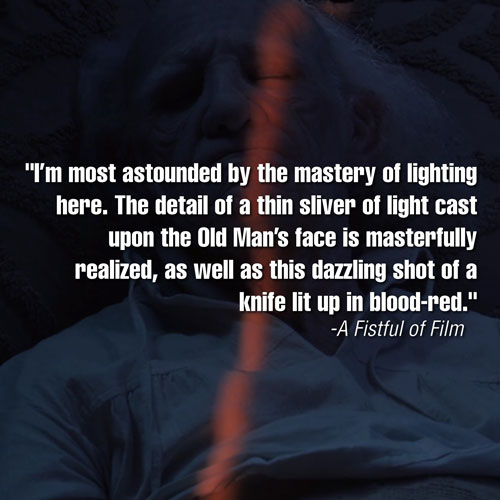
I don’t think I’ve ever been quite as pleasantly surprised as I have with this chance I was been afforded. The director of this short film, freshman filmmaker McClain Lindquist, reached out to me and offered a screener of his short film in anticipation of its festival run. The film is a new adaptation of The Tell-Tale Heart. Being a fan of the classic story, I said yes. What I had gotten was a fresh take on Poe’s tale told with a psychotronic flair that is as in debt to Roger Corman’s beloved Poe pictures of the 60s as it is to the surreal stylings of Dario Argento, and even a hint of Cronenberg thrown into the mix courtesy of stunning makeup effects work by Chris Hanson.
Lindquist’s take on the story sees our infamously unreliable narrator (played by Sonny Grimsley) in a fascinating state of delusion. He and the Old Man (played by James C. Morris) live locked in the period Poe has written the story, but as evidenced by the presence of Mikah Olsen’s Officer Sharpe and Teren Turner’s Detective Tucker, the world in which they inhabit is clearly out of step with the times. This, combined with a nonlinear narrative structure and the unhinged nature of the lead, allows you to become submerged into the fractured psyche of our nefarious storyteller.
Grimsley is undeniably the standout, walking the fine line between camp and class, and delivering Poe’s verbiage in a tremendously eloquent manner. The rest of the cast does fine, but Grimsley relishes in his role in a way that is charming and eerie. There is also a clear streak of black comedy to the piece, thanks to Grimsley’s dated mannerisms and murderous ways clashing with the contemporary nature of Olsen and Turner’s characters. Above all, what makes the film work like a charm is that, regardless of the modern qualities added to the story, is the unashamed Gothicism and surrealism the core narrative is treated with.
With a beautifully old-fashioned home, some marvelous period costuming, and Grimsley’s macabrely quaint narration, one can be forgiven for believing this to be a lost nugget in the cannon of Corman’s work, a string of adaptations noted for an exquisite attention to detail in spite of budgetary constraints. And like with Corman, there is plenty of room for flashes of expressionism. Armed with Joseph Olivas’s colorful and creative cinematography, the unnerving sound design of Jake Proctor, the aforementioned FX work from Hanson, and the effective scoring of Joel Pack, Lindquist keeps in the spirit of Poe’s work while lending it an off-the-wall grindhouse edge that makes for a bloody good time. I’m most astounded by the mastery of lighting here. The detail of a thin sliver of light cast upon the Old Man’s face is masterfully realized, as well as this dazzling shot of a knife lit up in blood-red.
Though one can be forgiven for finding the way the narrative jumps about more than a tad confusing, I love the direction Lindquist has taken the story. The brilliance of The Tell-Tale Heart as a piece of prose is that it allows you to slip into the mind of a killer in such a chilling way, and for my money’s worth, this latest retelling captures that quality by way of its schizophrenic structure, taking you between the Narrator’s recounting of the tale, the tale itself, and the fantastical realms in between. As we all await the revving up of film festivals the world over, this piece shall be subject to change, as I personally feel compelled to let you all know when and where you can find this marvelous short film.
Review can be found at: https://afistfuloffilm.com/2020/05/19/the-tell-tale-heart-2020-an-inventive-take-on-a-classic-story/
Macabre Media Review
By Kaleb Morgan
May 17, 2020
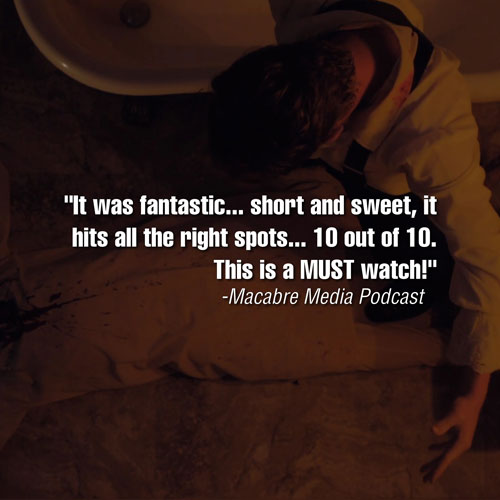
Podcast can be found at: https://macabremediapodcast.libsyn.com/-episode-34-the-tell-tale-heart-2020
As some of you may know I (Kaleb Morgan) cohost a podcast called Macabre Media Podcast. About a month ago a Twitter user with the handle @telltalefilm messaged me privately on my personal account sharing that they would love if Jorge and I left a review. Over the past month I have been inundated with finals but since my semester ended yesterday I made the review my top priority. We recorded an episode but its a little hard to pull a one-liner from that so here’s a blog post (don’t worry I will link the episode at the bottom with everything else).
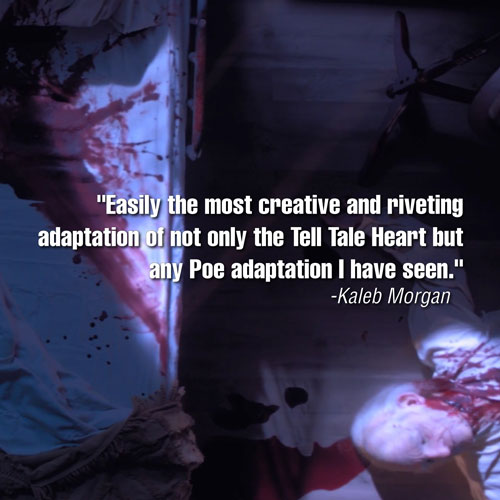
I will start off strong. Bassmints Pros Films is easily the most creative and riveting adaptation of not only The Tell Tale Heart but any Poe adaptation I have seen. The cinematography and sound design/score are at a level that exceeds the general limits of short films from indie studios. This was tremendously surprising considering the general struggle short films tend to endure when it comes to technicality. There is not a second of fluff and much like the original story it is jam packed in its short length. The practical effects and limited CGI were very well done (much to Jorge and my delight). The cinematography seemed to have inspirations from David Fynch, Panos Cosmatos, Dario Argento and maybe a dash of Stanley Kubrick. The score (composed by Joel Pack) is easily one of the best parts of the film, not saying the rest isn’t enjoyable.
What is most impressive to me is the directorial ability of McClain Lindquist. This was the mortician’s (and musician) first foray into directing and it was almost perfectly executed. I previously mentioned some inspirations and I want to explain my assumptions a bit here. The color palettes used in this film are what remind me of Panos Cosmatos and David Fynch. The quick and focused zoom-in shots remind me of Dario Argento and shots we see in the original Suspiria and Deep Red. Finally there seems to be a slight influence from Stanley Kubrick in the way some of the madness is portrayed and even some of the slower creeping shots. However, Lindquist sets up his own style in how he addresses certain sequences and even into some of the artistic choices he introduces into the story of The Tell Tale Heart.
I really only had one gripe with this film, which both Jorge and myself share and that’s the performance of the police officer and detective. Their line delivery seemed somewhat forced and inorganic. This wasn’t so bad as to dissuade us from the film or even make us not enjoy it but it was something we had both noticed.
Finally, I want to address the performance of Sonny Grimsley, which highlights the film. The film is certainly set in modern time, the police officers carry modern hand guns and drive cars, but that doesn’t stop the Narrator from maintaining the same internal dialogue and narration as the original text from 1843. He even goes so far as to wear the attire and speak in an accent (which left something desired for me). I believe this to be indicative of him being off. Grimsley’s ability to portray madness and insanity are exquisite and Lindquist capitalizes on this with effects and dialogue written for the conversation with the police.
This short film (22 minutes) hasn’t hit the festival circuit yet and we aren’t sure if or when it will be widely released but this was a very pleasant experience and if you don’t want to listen to our episode on Macabre Media Podcast (though you should), Jorge and I both rate this movie 10/10.
Review can be found at: https://frightfeatures.com/2020/05/17/the-tell-tale-heart-2020-short/
Movie Reviews 101 Review
By Darren
May 10, 2020
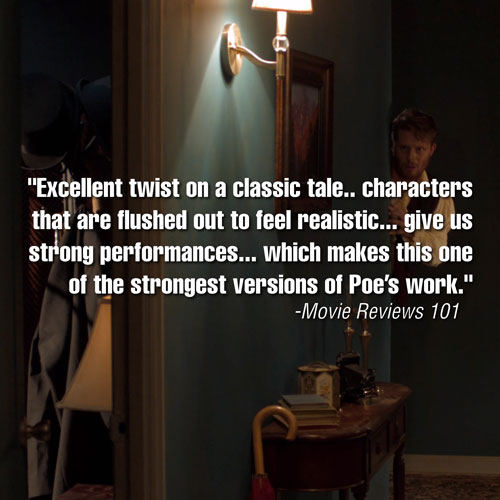
Director: McClain Lindquist
Writer: McClain Lindquist (Screenplay) Edgar Allan Poe (Story)
Starring: Sonny Grimsley, James C Morris, Mikah Olsen, Teren Turner
Plot: Adapted from Edgar Allen Poe’s original text, this Original psychological thriller Story has been re-imagined in this mind-bending, pulse-pounding, bloody-disgusting short film.
Tagline – Descend Into Madness
Runtime: 22 Minutes
There may be spoilers in the rest of the review
Verdict: Excellent Twist on a Classic Tale
Story: The Tell Tale Heart starts as Detective Tucker (Turner) and Officer Sharpe (Olsen) arrive at the mansion, greeted by the Narrator (Grimsley) who is being questions about the noises that occurred in the mansion the night before, as he tries to explain the noise, he dives into his own story that drove him to want to get rid of his master the Old Man (Morris) and his evil eye.
Thoughts on The Tell Tale Heart
Final Thoughts – Edgar Allan Poe gave us some of the greatest short stories, The Tell Tale Heart is one of the most famous, With this version we do mix modern investigation of what might have happened with the classic narration to show the descent into madness the narrator goes through due to his guilt coming through. We have four characters that are flushed out to feel realistic and to let the actors give us strong performances throughout. The camerawork and settings help increase the descent of the Narrator too, which makes this one of the strongest versions of Poe’s work.
Overall: Must Watch Poe adaptation.
Review can be found at: https://moviesreview101.com/2020/05/10/the-tell-tale-heart-2020-short-movie-review/
Erebus Horror Review
By Erebus Horror
May 9, 2020
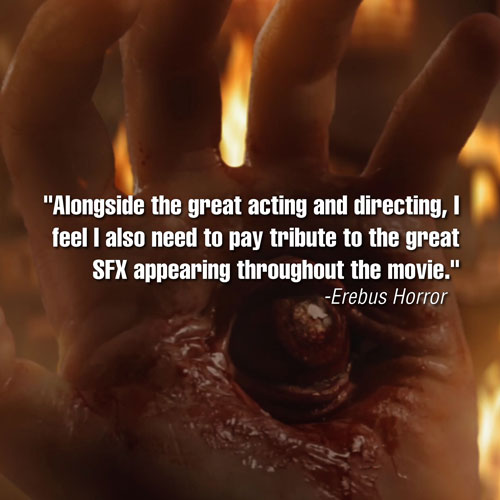
If you were to go up to any horror fan today and ask them to reel off a list of horror influencers, who do you think would be mentioned first? King? Lovecraft? Maybe this generation of fans wouldn’t even mention literature. Perhaps the likes of Romero or Craven would precede all others?
Yet, the truth is most of the above names would probably never have been a horror icon if it wasn’t for the influencers of the 1800’s. Bram Stoker, Mary Shelley and of course Edgar Allan Poe (among many others) sowed the seeds to what is now a rainforest of Amazonian proportions. Whilst some people may forget this, relying heavily on the influences of modern day pioneers, McClain Lindquist remains true to horror’s gothic roots.
Lindquist’s adaptation of ‘The Tell Tale Heart’ brings the story to life in just over 20 minutes. Staying true to Poe’s original prose, The Tell Tale Heart depicts The Narrator taking us through the dark realms of his psyche, all the while trying to convince us (and himself) that he is in fact sane.
I was initially intrigued as to how this visual portrayal would pan out. Would Lindquist stay true to the time period Poe originally perceived? Or would he give it a modern twist? The answer came within the first 20 seconds. Darkness, with only the fleeting conversation between a Police Officer and a Detective using current language. Modern day then? I’d say so… Until the words of the Police Officer conclude the dark sequence; “I hate the way he talks – It’s like an old movie.” Thus paving the way for The Narrator.
Depicted superbly by Sonny Grimsley, The Narrator’s prose, garb and mannerisms wouldn’t seem out of place on any theatrical stage. Lindquist successfully amalgamates the two time periods into one as we are taken on a journey through The Narrator’s dwindling grasp of reality. Whilst fans of Poe can be satisfied the depiction pays homage to the original, fans who have never read The Tell Tale Heart can also enjoy the traditional elements of horror throughout.
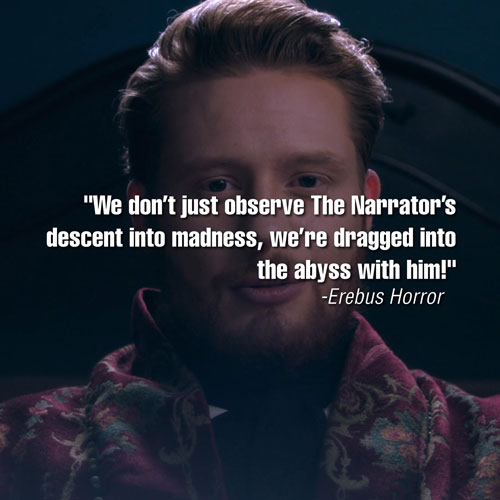
The movie contains shock, gore, suspense and most importantly it immerses the audience. We don’t just observe The Narrator’s descent into madness, we’re dragged into the abyss with him!
Alongside the great acting and directing, I feel I also need to pay tribute to the great SFX appearing throughout the movie. As you know, indie horror tends to be done on a budget, and as such we’re often treated to some cringe-worthy special effects. Yet those within The Tell Tale Heart are pretty impressive. There’s a vast amount of blood, gore and visual effects, not to mention the makeup/prosthetics used in transforming James C Morris into the old man. The SFX team have excelled and definintely need some recognition alongside everyone else involved in putting together this great short movie.
Review can be found at: https://erebushorror.wordpress.com/2020/05/09/the-tell-tale-heart/
Jared Gray Review
By Jared Gray
May 8, 2020
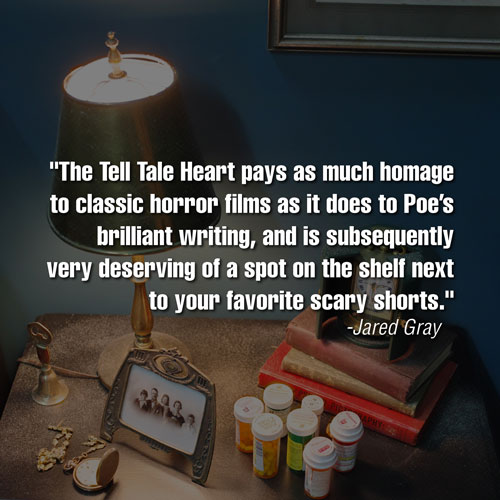
“I hate the way he talks,” begins Officer Sharpe (Mikah Olsen), “it’s like an old movie.” Indeed, Edgar Allan Poe’s classic tale is familiar enough to have been adapted many times over. To make another short film based on this story might be an idea born from madness. And yet, as Poe himself says in his original text: “Madmen know nothing.” McClain Lindquist (a horror fanatic responsible for both adaptation and direction) has smartly created something fresh and modern while remaining true to the timelessness of Poe’s original work.
All the elements are there in The Tell Tale Heart: an unreliable Narrator (Sonny Grimsley) who believes himself sane, the Old Man (a charming James C. Morris) with his cloudy “vulture eye”, the precision and calculation of the murder plot, the killing and dismemberment (presented in graphic, gory detail by an incredible special effects team), the concealment of the body beneath the floorboards. But Lindquist’s film is set in modern day and cleverly begins at the end of the story, told as a series of flashbacks during a police interrogation. The scenes abruptly jump back and forth between the historic house (exterior shots feature the Eccles Mansion in Ogden, UT) and the sterile interiors of the police station, sometimes seeming to merge the two environments together. This can make the timeline tricky to follow, especially considering the climactic moment of Poe’s text (when the Narrator’s guilty conscience gives him away) is moved from its expected place at the ending. To make things more confusing, both the Narrator and the Old Man are costumed in period clothing (excellent attention to detail by Janelle Corey and Katie Carlson) which contrasts the modern-day uniforms of Detective Tucker (Teren Turner) and Officer Sharpe (Olsen). But confusion might be exactly what Lindquist is going for. It’s all too apparent from the beginning that something is wrong with the Narrator, and perhaps we should be careful not to take his story at face value. After all, he is a madman, and if he believes in his version of the truth strongly enough, it becomes impossible not to see it for ourselves.
Sonny Grimsley shines as the charismatic Narrator, winning us over and earning a place alongside contemporary characters like Dexter Morgan or Patrick Bateman. The Narrator speaks with the heightened vernacular found in Poe’s writing, effectively believing himself to be of a different time, and Grimsley’s approach is compelling to watch as his grounded sanity slowly dissolves into madness.
This is a horror story, so expect a few well-placed jump scares and a lot of blood. Each shot of the film is artfully crafted (Director of Photography, Joseph Olivas), its soundtrack expertly punctuated by relentless ticking clocks and pounding heartbeats (Sound Design by Jacob Proctor), and all of it is woven together with a beautiful score by Joel Pack. With a few key visual elements (Grimsley’s knowing smirks evocative of Psycho’s Norman Bates, bulging doors not unlike those which possess the mansion in The Haunting, flashes of timepieces reminiscent of Damien Karras’s nightmares in The Exorcist), The Tell Tale Heart pays as much homage to classic horror films as it does to Poe’s brilliant writing, and is subsequently very deserving of a spot on the shelf next to your favorite scary shorts.
Lindquist’s choice to set The Tell Tale Heart in a modern setting is a bold one. Unlike in Poe’s time, this is a world with electricity and telephones. But just like in the original story, it’s also a world where a madman can perform an unspeakable crime and still believe his actions are justifiable — a sobering reminder of the violence and brutality we still face today.
